| Listing 1 - 10 of 38 | << page >> |
Sort by
|
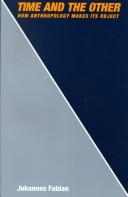
ISBN: 0231055919 0231055900 Year: 1983 Publisher: New York Columbia University Press
Abstract | Keywords | Export | Availability | Bookmark
 Loading...
Loading...Choose an application
- Reference Manager
- EndNote
- RefWorks (Direct export to RefWorks)
anthropology --- Ethnology. Cultural anthropology --- Anthropology --- Time --- Anthropologie --- Temps --- Philosophy --- Philosophie --- #SBIB:39A3 --- Antropologie: geschiedenis, theorie, wetenschap (incl. grondleggers van de antropologie als wetenschap) --- Time. --- Philosophy. --- Hours (Time) --- Geodetic astronomy --- Nautical astronomy --- Horology
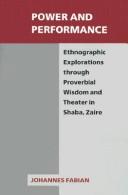
ISBN: 0299125149 0299125106 Year: 1990 Publisher: University of Wisconsin Press
Abstract | Keywords | Export | Availability | Bookmark
 Loading...
Loading...Choose an application
- Reference Manager
- EndNote
- RefWorks (Direct export to RefWorks)
Folklore --- Theatrical science --- Political sociology --- Katanga --- Filosofie [Luba (Afrikaanse volk) ] --- Luba (African people) --- Luba (Afrikaanse volk) --- Luba (Peuple africain) --- Macht (Sociale wetenschappen) --- Philosophie [Luba (Peuple africain) ] --- Philosophy [Luba (African people) ] --- Political power --- Pouvoir (Sciences sociales) --- Power (Social sciences) --- Philosophy, Luba --- Theater --- Luba (Peuple d'Afrique) --- Philosophie luba --- Théâtre --- Groupe Mufwankolo --- Troupe Théâtrale Mufwankolo --- #SBIB:39A8 --- #SBIB:39A73 --- Antropologie: linguïstiek, audiovisuele cultuur, antropologie van media en representatie --- Etnografie: Afrika --- Philosophy, Luba. --- Luba (African people). --- Power (Social sciences). --- Théâtre --- Troupe Théâtrale Mufwankolo --- Dramatics --- Histrionics --- Professional theater --- Stage --- Theatre --- Performing arts --- Acting --- Actors --- Empowerment (Social sciences) --- Exchange theory (Sociology) --- Political science --- Social sciences --- Sociology --- Consensus (Social sciences) --- Philosophy, Luba (African people) --- Luba philosophy --- Baluba --- Baluba (African people) --- Kayumba (African people) --- Laba (African people) --- Luba Shaba (African people) --- Luba Shakandi (African people) --- Mulongo (African people) --- Nkondja (African people) --- Nkulu (African people) --- Tumba (African people) --- Turruba (African people) --- Waluba (African people) --- Bantu-speaking peoples --- Ethnology --- Groupe Mufwankolo. --- Shaba (Zaire)
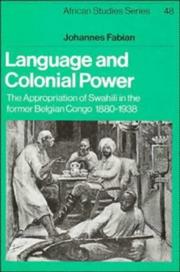
ISBN: 0521308704 9780521308700 Year: 1986 Volume: 48 Publisher: Cambridge : Cambridge university press,
Abstract | Keywords | Export | Availability | Bookmark
 Loading...
Loading...Choose an application
- Reference Manager
- EndNote
- RefWorks (Direct export to RefWorks)
Swahili language --- Swahili (Langue) --- Social aspects --- Aspect social --- Shaba (Congo) --- Languages --- Colonial influence --- Langues --- Influence coloniale --- Sociolinguistics --- #SBIB:39A8 --- #SBIB:39A73 --- -Swahili language --- -Kiswahili language --- Suaheli language --- Bantu languages --- Language and languages --- Language and society --- Society and language --- Sociology of language --- Language and culture --- Linguistics --- Sociology --- Integrational linguistics (Oxford school) --- Antropologie: linguïstiek, audiovisuele cultuur, antropologie van media en representatie --- Etnografie: Afrika --- -Social aspects --- Sociological aspects --- -Antropologie: linguïstiek, audiovisuele cultuur, antropologie van media en representatie --- -#SBIB:39A8 --- Kiswahili language --- Swahili language - Social aspects - Congo (Democratic Republic) - Katanga --- Sociolinguistics - Congo (Democratic Republic) - Katanga

ISBN: 0813917859 0813917867 Year: 1998 Publisher: Charlottesville : University Press of Virginia,
Abstract | Keywords | Export | Availability | Bookmark
 Loading...
Loading...Choose an application
- Reference Manager
- EndNote
- RefWorks (Direct export to RefWorks)
Ethnology --- Popular culture --- Anthropologie sociale et culturelle --- Culture populaire --- Katanga (Congo) --- Social life and customs. --- Moeurs et coutumes --- #SBIB:39A5 --- #SBIB:309H040 --- #SBIB:316.7C140 --- Kunst, habitat, materiële cultuur en ontspanning --- Populaire cultuur algemeen --- Cultuursociologie: cultuur en globale samenlevingen --- Culture, Popular --- Mass culture --- Pop culture --- Popular arts --- Communication --- Intellectual life --- Mass society --- Recreation --- Culture --- Cultural anthropology --- Ethnography --- Races of man --- Social anthropology --- Anthropology --- Human beings --- Garenganze (Congo) --- Katanga, Congo (Province) --- Katanga (Zaire) --- Katanga (Secessionist government, 1960-1963) --- Shaba (Zaire) --- Lualaba (Congo : Province) --- Haut-Lomami (Congo) --- Haut-Katanga (Congo) --- Tanganyika (Congo)

ISBN: 0804741425 0804741433 9780804741439 Year: 2001 Publisher: Stanford, Calif.: Stanford university press,
Abstract | Keywords | Export | Availability | Bookmark
 Loading...
Loading...Choose an application
- Reference Manager
- EndNote
- RefWorks (Direct export to RefWorks)
This book collects published and unpublished work over the last dozen years by one of today's most distinguished and provocative anthropologists. Johannes Fabian is widely known outside of his discipline because his work so often overcomes traditional scholarly boundaries to bring fresh insight to central topics in philosophy, history, and cultural studies. The first part of the book addresses questions of current critical concern: Does it still make sense to search for objectivity in ethnography? What do we gain when we invoke "context" in our interpretations? How does literacy change the work of the ethnographer, and what are the boundaries between ethnology and history? This part ends with a plea for recuperating negativity in our thinking about culture. The second part extends the work of critique into the past by examining the beginning of modern ethnography in the exploration of Central Africa during the late nineteenth century: the justification of a scientific attitude, the collecting of ethnographic objects, the presentation of knowledge in narration, and the role of recognition-given or denied-in encounters with Africans. A final essay examines how the Congolese have returned the "imperial gaze" of Belgium by the work of critical memory in popular history. The ten chapters are framed by two meditations on the relevance of theory and the irrelevance of the millennium
Anthropology --- Anthropologie --- Philosophy --- Methodology --- Authorship --- Philosophie --- Méthodologie --- Art d'écrire --- #SBIB:39A3 --- Antropologie: geschiedenis, theorie, wetenschap (incl. grondleggers van de antropologie als wetenschap) --- Authorship. --- Methodology. --- Philosophy. --- Méthodologie --- Art d'écrire --- Human beings --- Primitive societies --- Anthropology - Philosophy --- Anthropology - Methodology --- Anthropology - Authorship. --- Anthropologists. --- Authors --- Social sciences
Book
ISBN: 9780822342830 9780822342618 0822342618 0822342839 9786613062130 1283062135 0822381206 9781283062138 9780822381204 Year: 2008 Publisher: Durham : Duke University Press,
Abstract | Keywords | Export | Availability | Bookmark
 Loading...
Loading...Choose an application
- Reference Manager
- EndNote
- RefWorks (Direct export to RefWorks)
Leading anthropologist reconsiders his notes and interviews from his fieldwork in the Congo in order to comment on ethnographic practices.
Ethnology --- Communication in ethnology. --- Communication and culture. --- Anthropologie sociale et culturelle --- Communication en ethnologie --- Communication et culture --- Computer network resources. --- Authorship. --- Ressources Internet --- Art d'écrire --- #SBIB:39A3 --- Culture and communication --- Culture --- Cultural anthropology --- Ethnography --- Races of man --- Social anthropology --- Anthropology --- Human beings --- Antropologie: geschiedenis, theorie, wetenschap (incl. grondleggers van de antropologie als wetenschap) --- Communication in ethnology --- Communication and culture --- Computer network resources --- Authorship --- Art d'écrire --- Ethnology - Computer network resources --- Ethnology - Authorship --- Social Science --- Cultural & Social --- Ethnologie --- Recherche
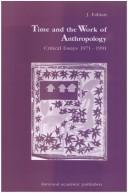
ISBN: 3718651793 3718652226 Year: 1991 Volume: 3 Publisher: Reading (Berkshire) : Harwood academic publ.,
Abstract | Keywords | Export | Availability | Bookmark
 Loading...
Loading...Choose an application
- Reference Manager
- EndNote
- RefWorks (Direct export to RefWorks)
Anthropology --- Methodology. --- Philosophy. --- Anthropologie --- Methodology --- Philosophy --- Méthodologie --- Philosophie
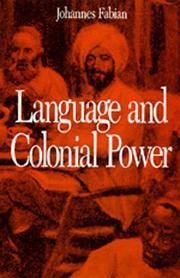
ISBN: 1282356070 9786612356070 0520911865 0585081468 9780520911864 9780585081465 9781282356078 0520076257 Year: 1991 Publisher: Berkeley, CA : University of California Press,
Abstract | Keywords | Export | Availability | Bookmark
 Loading...
Loading...Choose an application
- Reference Manager
- EndNote
- RefWorks (Direct export to RefWorks)
In this study, inquiry will be directed to the past, and it will, for many reasons, have to reach into a past which is rather remote from present-day Shaba Swahili. The author's principal concern remains with a contemporary situation, namely the role of Swahili in the context of work, industrial, artisanal, and artistic. When it was first formulated, the aim of my project was to describe what might be called the workers' culture of Shaba, through analyses of communicative (sociolinguistic) and cognitive (ethnosemantic) aspects of language use.
Swahili language --- Kiswahili language --- Suaheli language --- Bantu languages --- Social aspects --- Katanga (Congo) --- Garenganze (Congo) --- Katanga, Congo (Province) --- Katanga (Zaire) --- Katanga (Secessionist government, 1960-1963) --- Shaba (Zaire) --- Lualaba (Congo : Province) --- Haut-Lomami (Congo) --- Haut-Katanga (Congo) --- Tanganyika (Congo) --- Languages --- Social aspects. --- africa. --- african history. --- african languages. --- bangala. --- belgian colonial. --- belgian congo. --- bemba. --- bunkeya. --- colonial administration. --- colonial charter. --- colonial power. --- colonial rule. --- colonialism and empire. --- colonialism. --- colonized subjects. --- congo swahili. --- congolese. --- expeditions. --- history congo. --- history. --- imperialism. --- katanga. --- labor. --- language use. --- language. --- linguistics. --- missionaries. --- missions. --- nonfiction. --- pidgin. --- politics. --- post colonialism. --- semiotics theory. --- shaba. --- sociolinguistics. --- swahili.

ISBN: 0585129223 0520917324 9780520917323 9780585129228 0520203755 0520203763 Year: 1996 Publisher: Berkeley, CA : University of California Press,
Abstract | Keywords | Export | Availability | Bookmark
 Loading...
Loading...Choose an application
- Reference Manager
- EndNote
- RefWorks (Direct export to RefWorks)
Congo (Democratic Republic) --- Visual Arts --- Art, Architecture & Applied Arts --- Painting --- Exhibitions --- In art --- Tshibumba Kanda Matulu --- Themes, motives. --- Criticism and interpretation. --- Matulu, Tshibumba Kanda --- Kanda Matulu, Tshibumba --- Congo DR --- Congo (Kinshasa) --- Congo (Leopoldville) --- Democratic Republic of Congo --- Democratic Republic of the Congo --- Demokraticheskai︠a︡ Respublika Kongo --- DR Congo --- DRC (Democratic Republic of the Congo) --- DRK (Demokraticheskai︠a︡ Respublika Kongo) --- Kongo --- R.D. Congo --- RD Congo --- RDC (République démocratique du Congo) --- Republic of Congo (Leopoldville) --- Republic of the Congo (Leopoldville) --- République démocratique du Congo --- République du Congo (Leopoldville) --- Belgian Congo --- Zaire
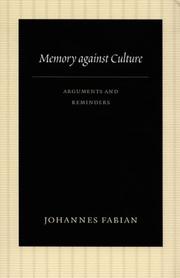
ISBN: 9780822340775 9780822340560 Year: 2007 Publisher: Durham : Duke University Press,
Abstract | Keywords | Export | Availability | Bookmark
 Loading...
Loading...Choose an application
- Reference Manager
- EndNote
- RefWorks (Direct export to RefWorks)
Anthropology --- Anthropologie --- Philosophy. --- Methodology. --- Philosophie --- Méthodologie
| Listing 1 - 10 of 38 | << page >> |
Sort by
|

 Search
Search Feedback
Feedback About UniCat
About UniCat  Help
Help News
News